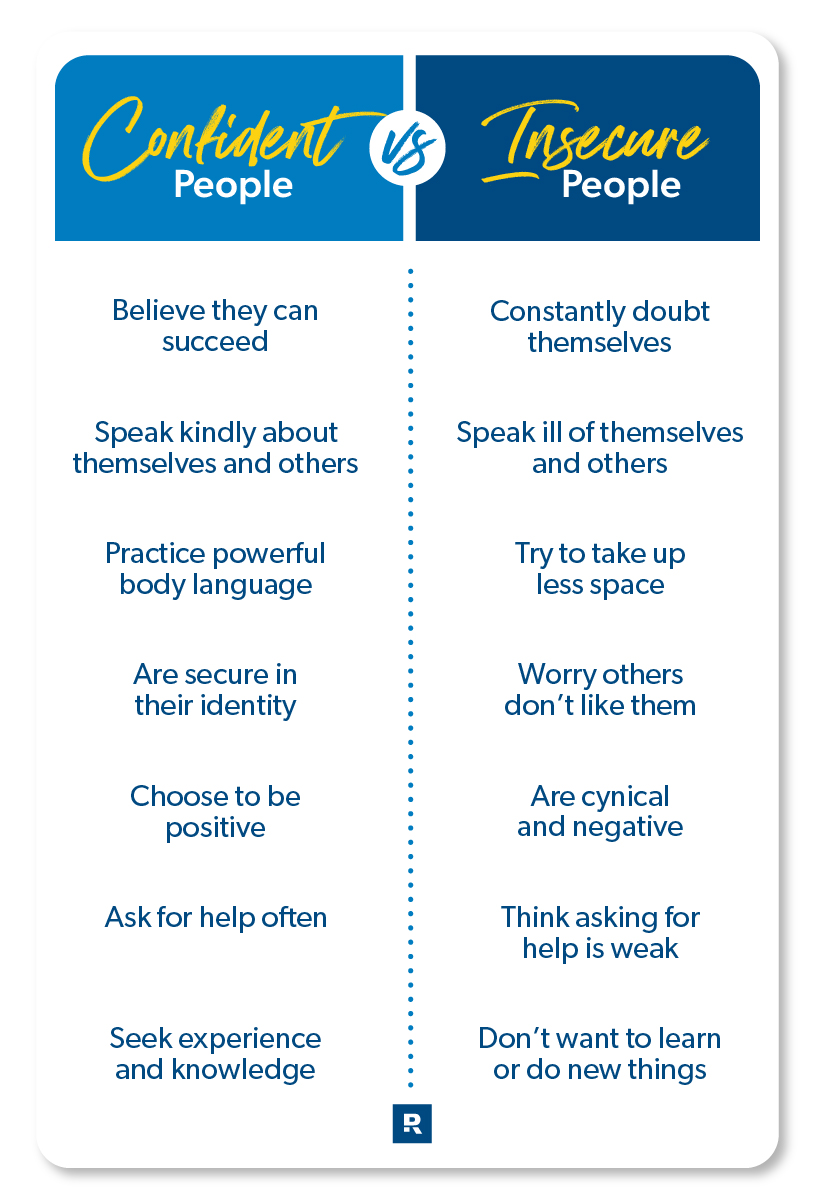
Whether you’re quiet or loud, even-keeled or excitable, an introvert or extrovert, one of the keys to success in every area of life is confidence. But when you’re struggling with feelings of insecurity and self-doubt, learning how to be more confident can seem hard to grasp. I’ve been there myself.
If you’re feeling insecure, you can learn how to be more confident. That’s right—confidence is a skill. So how do you become more confident? Let’s unpack what it means to be confident and how we can build that self-esteem muscle.
What Is Confidence?
Confidence is a person’s sense of self-assurance and trust in themselves to make decisions with the best outcome in mind.
Confidence is a skill you can develop over time. It’s like a muscle: If you never use it, it’s weak at first. But with some practice and exercise, that muscle will become stronger. Using it will become easier. Before you know it, the feeling of self-assurance will be authentic. You’ll feel better, stronger and—most of all—more confident.
The Benefits of Being More Confident
It probably comes as no surprise that people who are more confident see more positive results in their life. People who have high self-acceptance and self-esteem are naturally happier. And our level of self-confidence heavily influences the decisions we make about our careers and even our relationships.
Get expert money advice to reach your money goals faster!
If you only take one thing away from these tips on how to be more confident, I hope it’s this: Confidence isn’t something you’re born with. It’s not something you can only have if you had a perfect childhood, were popular in high school, or have been groomed for leadership your whole life. Everyone can learn how to be more confident, starting today.
Differences Between Confidence and Insecurity

We all know someone who seems naturally confident. We admire the way they can sway a room, carry a conversation, or trust their instincts. But the truth is that they weren’t born with some predetermined “self-confidence gene.” They developed and practiced those skills over and over until they became second nature.
Insecurity works the same way too. If you feel insecure, just know you don’t have to feel that way forever. Insecurity is not one of your personality traits, and you can learn how to be more confident over time.
10 Steps to Be More Confident
Developing confidence is all about lots of tiny wins that stretch your comfort zone. I think you’ll find that when you practice these 10 simple things, you’ll start to truly be more self-confident.
1. Learn something new.
Becoming more confident starts in your mind. Instead of immediately assuming you can’t accomplish something, believe you have what it takes to figure it out. In other words, don’t be afraid to learn something new. This can include solving a problem on your own or taking a class to expand your skills. The more you seek answers and find them, the more your confidence will grow.
2. Speak on purpose.
Whether you realize it or not, the words you speak shape your beliefs about yourself—and what others believe about you. For example, when we downplay a compliment, we aren’t just dismissing the truth in the statement—we’re dishonoring the person saying it. We’re ignoring their efforts to encourage us, and at the same time, we’re damaging our own sense of self.
The lack of confidence in the words we use affects every area of our lives. For example, we apologize when there’s nothing to apologize for. Have you ever apologized for:
- Speaking up in a meeting (“I’m sorry, I just wanted to say . . .”)
- Negotiating your salary (“Sorry, I know it’s a little more . . .”)
- Asking a server at a restaurant for a refill (“Sorry to bother you, but when you get a chance . . .”)
When we say we’re sorry all the time, we make people believe we have something to be sorry for when we actually don’t. That also goes for the words we speak about others. Gossiping and putting others down always comes from a place of insecurity. Practice building others up with your words instead. That’s a surefire way to be more confident!
3. Change your body language.
One of the easiest confidence tips is to pay attention to your body language. Social psychologist Amy Cuddy says your body language “can significantly change the outcome” of your life.1
In her research, Cuddy found that confident people (as well as animals) have higher levels of testosterone. She conducted experiments to see if people could raise their testosterone levels simply by exhibiting a “high power pose.” Basically, they make themselves appear bigger instead of smaller—shoulders back, arms and legs relaxed, and more confident in their space.
What were the results?
After just two minutes of posing this way, the participants’ testosterone levels went up by 20%!2 So instead of slumping in your chair, sit up straight. Rather than crossing your arms, leave them open. See how these simple tweaks change your confidence.
4. Embrace your skills and talents.
You were created on purpose, for a purpose. So embrace what you’re good at and watch your confidence rise. Take a few minutes to think about what you do well. What are the people skills, character traits and work abilities you know you’re good at? For example, I’m great at reading people and coaching them, producing content and coming up with big ideas. When I focus on these things, my confidence grows. But I’m not good at being on time, focusing on tiny details, or doing anything mechanical. And that’s okay.
When you know what you’re good at, you can choose actions, activities and jobs that are in line with who you are and who you want to be. When you’re secure in your identity and can express that through your work and hobbies, you’re more willing to speak up, take risks, and try new things. People around you can’t help but notice that kind of confidence.
5. Do hard things.
In any situation where the rules aren’t clear and the path isn’t marked, you have two choices.
You can assume you can’t (or that you’re not allowed or you don’t know how).
Or you can assume you can. You can try when you don’t know how. And what’s the worst that can happen? Someone might correct you and tell you no.
Hard things demand grit and perseverance, time and commitment. It was hard for me to get started in broadcasting and learn how to develop a show, deliver it to an audience, hit all the right buttons, take calls . . . but I learned two things on the other side of doing something hard: I survived, and I have what it takes.
Confidence doesn’t mean you know something’s going to turn out perfectly—it means you’re willing to take a chance and try. And if you really want to learn how to be more confident, don’t let fear of failure or rejection hold you back.
6. Learn from the best.
Do you know when it’s super easy to not feel confident? When you don’t know what you don’t know. And that’s where finding a mentor can make a big difference.
Sometimes, to gain confidence, all you need is a nudge in the right direction, and that’s exactly what mentors are for. They can point out your blind spots, help you make a plan to grow, and figure out the best next steps to achieve your goals.
7. Find your style.
One way to step up your confidence is to create a personal style you feel good in and that emphasizes your favorite features and personality traits. For example, if you’re deciding what to wear to an interview, you’ll want to pick out an outfit that fits properly and reflects your personality.
Are you someone who’s bold and experimental, or traditional and buttoned up? Whatever your style is, don’t be afraid to show that off with your wardrobe. You don’t have to spend a bunch of money on new clothes, but showing off your style can be a big boost to your confidence. After all, when you look good, you feel good.
8. Get healthy.
If you don’t wake up feeling alert and energized, your confidence won’t be all that it can be. Sometimes we feel fueled to achieve because we’re actually insecure—this can be a sign of high-functioning anxiety. So we might overachieve at work to make up for not feeling secure in our relationships, or we go into debt to keep up with the Joneses. But these behaviors don’t equate to real confidence. True confidence means you’re also working on building a non-anxious life by bettering your mind, body and spirit alongside accomplishing your goals.
9. Build your community.
When you’re part of a community, you’ll feel a sense of belonging and contribution. Getting involved in peer groups is an underrated part of building your confidence and self-esteem. One of the best ways to do this (even if you’re not feeling confident) is to make friends based on common interests and values. You can get started in a church group, a kickball league, a book club—anything fun and social. Even better if the group helps you learn new things.
10. Make a plan.
When you’re building your confidence muscle, focus on who you want to be instead of who you feel like you are, especially if you’re struggling with insecurity. What do you want to be known for? When you decide what kind of person you’re going to be, it brings your deepest values front and center in your life. This is the starting place for deciding what matters most to you and making a plan to accomplish your goals.
Grow Your Career Confidence
These 10 tips to become more confident will serve you in all areas of your life—including your career. And if you want to learn more about yourself and your skills so you can continue to grow in your confidence, check out the Get Clear Career Assessment. It’s an online assessment that will help you identify your top talents, passions and mission so you can chart a path to doing work you were made to do. Check it out!



